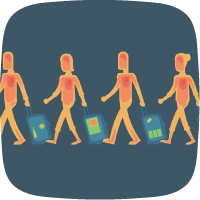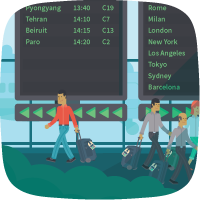A 2020s Travel Landscape
To understand our 2020s traveller’s journey, we need to consider the technological, economic and social forces that will reshape the global travel industry over the next 10 years.
Perhaps the most far-reaching factor at work is the growth towards Digital Maturity. In 2014, cyberspace and its associated technologies are no longer as novel and surprising. They are becoming the backdrop to all of our lives.
In China, 464m people, or 34.5% of the total population, now access the internet through smartphones or wireless mobile devices, according to the China Internet Network Information Center. Asia will see the biggest growth in the middle class – predicted to triple to 1.7bn by 2020, according to Brookings Institution – whose spending power will drive new global behaviour and attitudes to digital technology.
By 2024, internet connectivity – and the mobile devices that enable it – will be as unremarkable as electric lighting and central heating are today. The technology will be seamlessly enmeshed in the day-to-day world of travellers in both the developed and developing economies. According to Cisco Systems, there will be 50bn devices connected to the internet by 2020.
Simultaneously, there will be an explosion of travel from the Blossoming Markets of Asia, South America and Africa – the new emerging economies of each region – as their consumer spending power increases enormously.
By 2030, Asia, the world’s largest and fastest-growing regional economy, will double its GDP to US$67 trillion, outstripping GDP projections for Europe and the Americas combined, according to the Boston Consulting Group.
Travelling millions from the Blossoming Markets are ushering in an era of Global Mobility, with the global travel industry – and therefore demand for travel opportunities and experiences – expanding rapidly in the next decade.
The World Travel & Tourism Council forecast 3.2% growth in global travel in 2013, easily outstripping the predicted 2.4% growth in global GDP. The gap was even more pronounced in the emerging economies in 2012, where China and South Africa posted 7% annual travel growth and Indonesia reported a 6% rise.
The financial ebullience of the Blossoming Markets will be a necessary global antidote to the continuing economic turbulence that will shape the attitude of travellers in the Pruned Markets – the economies in Europe and the US whose growth has been cut back in the past five years by post-crash debt and austerity.
As IPK International’s Global Travel Trends report 2012/2013 says: ‘An increasing number of these countries are not able to pay their debts, the debt crisis has not reached its end and the resulting negative impacts on travel behaviour – so-called ‘downward mobility’ – in Western Europe, the USA and Japan cannot be excluded.’
The final factor that will help to define the global travel industry of the 2020s is a social one. A Demographic Timebomb is waiting in the wings as the world’s population ages at an unprecedented rate.
The past century has witnessed the most rapid decline in mortality rates in human history with life expectancy for the world as a whole rising from 47 in 1950–1955 to 69 in 2005–2010, according to the UN.
In 1950, there were twice as many children under 15 as adults over 60. By 2050, the 60+ group will outnumber children by two to one.
So, in 2024, our traveller will make his journey in a world in which Blossoming Market demand for new experiences is counter-balanced by the financial caution of the still-recovering Pruned Markets of Europe and the US.
And he will take it as a given that every aspect of travel, from discovery and booking to transit and flying, will incorporate the latest digital technology in the way that he does – seamlessly and unselfconsciously.
Related Articles































